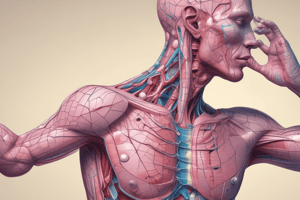Podcast
Questions and Answers
Which of the following are functions of connective tissue? (Select all that apply)
Which of the following are functions of connective tissue? (Select all that apply)
- Transporting (correct)
- Cushioning and insulating (correct)
- Enclosing and separating (correct)
- Connecting tissues to one another (correct)
- Supporting and moving (correct)
- Regulating temperature
- Protecting (correct)
What provides protection in connective tissue?
What provides protection in connective tissue?
Cells of the immune system and blood
What substances does blood transport throughout the body?
What substances does blood transport throughout the body?
Gases, nutrients, enzymes, hormones, and cells of the immune system
What role does connective tissue play in supporting and moving?
What role does connective tissue play in supporting and moving?
What does adipose tissue store?
What does adipose tissue store?
How does adipose tissue contribute to insulation?
How does adipose tissue contribute to insulation?
What is the function of ligaments in connective tissue?
What is the function of ligaments in connective tissue?
Connective tissue forms capsules around organs, such as the _____ and _____
Connective tissue forms capsules around organs, such as the _____ and _____
Match the following functions of connective tissue with their descriptions:
Match the following functions of connective tissue with their descriptions:
Flashcards
Protection in Connective Tissue
Protection in Connective Tissue
Cells of the immune system and blood.
Blood's Transport Contents
Blood's Transport Contents
Gases, nutrients, enzymes, hormones, and cells of the immune system.
Connective Tissue's Support Role
Connective Tissue's Support Role
Provides rigid support throughout bones and supports structures like cartilage.
Adipose Tissue Storage
Adipose Tissue Storage
Signup and view all the flashcards
Adipose Tissue Insulation
Adipose Tissue Insulation
Signup and view all the flashcards
Ligaments Function
Ligaments Function
Signup and view all the flashcards
Organs with Connective Tissue Capsules
Organs with Connective Tissue Capsules
Signup and view all the flashcards
Study Notes
Functions of Connective Tissue
- Encloses and separates organs via connective tissue sheets, creating capsules around structures like the liver and kidneys.
- Connects different tissues, exemplified by tendons attaching muscles to bones and ligaments linking bones together.
- Provides support and movement through the skeletal system, where bones offer rigidity and cartilage supports softer structures such as the ears and joints.
- Stores energy in adipose tissue and essential minerals like calcium and phosphate in bones.
- Cushions and protects surrounding tissues; adipose tissue acts as a shock absorber and insulator beneath the skin.
- Transports vital substances in blood, including gases, nutrients, hormones, and immune cells.
- Protects the body through immune system cells, blood components, and bony structures that shield organs from injury and pathogens.
Studying That Suits You
Use AI to generate personalized quizzes and flashcards to suit your learning preferences.




